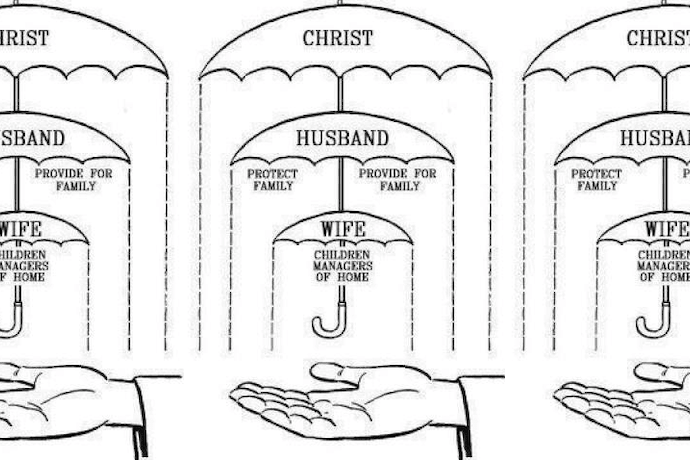Last Thursday, Josh Duggar’s sexual misconduct once again brought his reality TV-famous family into the spotlight. The 33-year-old was arrested Thursday on federal charges of receiving and possessing child sexual abuse materials, charges that carry a potential sentence of 20 years in federal prison. Just a few years prior, in 2015, Duggar made headlines after InTouch released a redacted, FOIA-obtained police report from 2006 that implicated Josh in the molestation of five girls, the youngest of whom was only five years old.
It was a scandal on the heels of another scandal in the Duggars’ close-knit Christian homeschooling community, centered around the community’s patriarch himself. In 2014, Bill Gothard, the never-married, childless founder of the evangelical family ministry and homeschooling organization Institute of Basic Life Principles (IBLP), was edged out of his own organization after more than 30 women came forward with allegations of his sexual misconduct. While Gothard has never managed to regain his standing or authority within the IBLP organization, the Duggars are still regular attendees and speakers at IBLP conferences.
In fact, Jim Bob and Michelle were in Big Sandy, Texas preparing to deliver a speech at the IBLP annual Family Conferences last week when a warrant went out for their son’s arrest.
The prevalence of sexual predation among IBLP leaders and devotees is no coincidence. As Chrissy Stroop writes here on RD, Josh Duggar’s indiscretions are just one symptom of far deeper theological roots that enable abusers and gaslight, shame, and isolate victims. Stroop claims—correctly, I think—that the Duggars’ beliefs are only a more extreme iteration of theological stances embraced by the lion’s share of American evangelicals: namely, complementarian gender roles and purity culture, upheld and reinforced by a patriarchal authority structure.
But what exactly are the beliefs about authority and gender that animate the Duggar home? In their long-running TV show, their family blog, and their memoirs, the Duggars offer a picture of some of the beliefs and practices that structure their family life.
Umbrella of protection and authority
One of IBLP’s foundational principles is the structure of authority undergirding divine and human relationships. An IBLP graphic illustrates this system as a nesting set of umbrellas of protection, with God protecting and ruling over husbands, who protect and rule over wives, who (together with their husbands) protect and rule over their children.
As the IBLP website details, a Godly wife realizes that “helping her husband fulfill his goals and dreams” should be her “main responsibility.” Even when a wife believes her husband is going down the wrong path, IBLP teaches, she must not “take over,” but instead “wisely appeal wrong decisions, and then give him room to fail.” Indeed, it is this kind of “adversity” that will allow her to grow her loyalty and cultivate “a meek and quiet spirit.”
When Josh married Anna Keller, whose family is also deeply enmeshed in IBLP, they professed their support for this scaffolding structure of authority in their own relationship. In Josh and Anna’s wedding special for 17 Kids and Counting, Anna’s father Mike Keller describes how this system informed both families’ approach to their children’s marriage:
“The way God ordained it all, Josh becomes the authority at the wedding. He becomes her authority, not me, and that’s the way God designed the transfer of authority. And it’s a good design,” Keller tells the camera.
Chains of command and instant obedience
The Duggars note that they extend this structure of authority to their children via what they call a “chain of command” determined by birth order. In Growing Up Duggar, a memoir cowritten by sisters Jana, Jill, Jessa, and Jinger Duggar, the siblings recount,
“Mom and Dad have banned the phrases ‘You can’t tell me what to do!’ and ‘You’re not my boss!’ from our home, and they remind the younger children that their older siblings are their elders and they should treat them as such. So Johannah can ask Josie to help her pick up the toys in the playroom, and Josie needs to do it.”
Not only are the Duggar children instructed to be obedient to the requests of their elder siblings and their parents, but they’re specifically instructed to obey in accordance with the IBLP’s mandated “points of obedience,” described by the Duggar daughters as “instant,””cheerful,” “thorough,” and “unconditional.”
Michelle and Jim Bob Duggar, too, highlight the importance of unconditional obedience to one’s authority figures in their own memoir, 20 and Counting! The couple write that they teach the children to play an “obedience game” in order to “make instantly obeying fun.” During the game, both Duggar parents will issue nonsensical instructions to the children (Michelle offers the example of telling a child to stand on a tile square and scratch her head with her left hand and rub her tummy with her right hand while counting to fifty”). The children are required to respond, “Yes sir/ma’am, I’d be happy to!” and then instantly complete the task.
Created differences and men’s sexual needs
As Chrissy Stroop notes, much evangelical discourse lacks a robust understanding of consent. This tendency is often fueled by a theological understanding of men and women as inherently different in both biology and behavior. The IBLP teaches, like many conservative Christian theologies, that “God created male and female and made a clear distinction between them.”
One key difference the Duggar family identifies between men and women is a difference in sex drive. In her blog, Michelle Duggar recounts advice from a friend that, while other women could iron Jim Bob’s shirts and make him lunch, only she can provide him with sexual intimacy. Michelle encourages readers to “be available, and not just available, but be joyfully available” for their husbands.
“Smile and be willing to say, ‘Yes, sweetie I am here for you,’ no matter what, even though you may be exhausted and big pregnant and you may not feel like he feels,” Michelle writes. “‘I’m still here for you and I’m going to meet that need because I know it’s a need for you.’”
Just as IBLP teaches that women should not usurp their husbands’ authority in other arenas, so too does the organization assert that “God grants spouses full access to each other’s bodies for sexual gratification.” Identifying that wives might be the party in the marriage more likely to want to abstain, IBLP directs wives, “Resistance or indifference to your husband’s need for physical intimacy is the unspoken crushing of his spirit.”
While a belief in men’s “natural” sexual voracity might not immediately present itself as fodder for the cycle of abuse, the Duggars’ response to their son’s molestation of his own younger sisters illustrates the danger in such a belief. In their first television appearance following the 2015 scandal, Jim Bob and Michelle Duggar told Fox News’s Megyn Kelly that they put “safeguards” in place that they believed would ward off any more in-house sexual predation.
“We don’t let boys babysit,” Michelle told Kelly. “There are just a lot of things we’ve put in place. You’re not alone in a room with someone else. Always be out visible, and, you know, little ones don’t sit on big boys’ laps or people that you don’t know, or even family members, unless it’s your daddy.”
By suggesting that the risk to her daughters was proximity to any boys or men, Michelle Duggar simultaneously normalized her son’s predation as something “any” man might do and failed to guard her children from their molester any more fully than they guarded them from any other men. Which is to say, not nearly enough.
While the Duggars’ beliefs about gender and authority represent an extreme iteration of broader evangelical theologies of gender and submission, they nevertheless demonstrate the logical conclusion of such theologies. As long as wives and children are exhorted to submit “instantly” and “cheerfully” to their “God-ordained authorities,” even in the realm of sexual gratification, we will continue to see a pattern of abuse and cover-up in the evangelical church.





